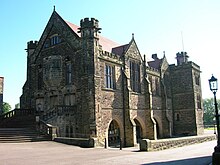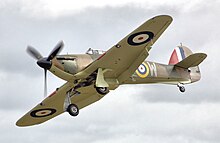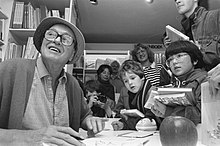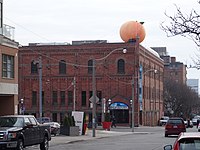Roald Dahl
[9] Dahl's short stories are known for their unexpected endings, and his children's books for their unsentimental, macabre, often darkly comic mood, featuring villainous adult enemies of the child characters.
[12][13] His works for children include James and the Giant Peach, Charlie and the Chocolate Factory, Matilda, The Witches, Fantastic Mr Fox, The BFG, The Twits, George's Marvellous Medicine and Danny, the Champion of the World.
[16] Roald's mother belonged to a well-established Norwegian family of lawyers, priests in the state church and wealthy merchants and estate owners, and emigrated to Britain when she married his father in 1911.
[21][22][23] Dahl's mother decided to remain in Wales instead of returning to Norway to live with relatives, as her husband had wanted their children to be educated in English schools, which he considered the world's best.
[25][26] The meeting, which took place at Potter's home, Hill Top in the Lake District, north west England, was dramatised in the 2020 television film, Roald & Beatrix: The Tail of the Curious Mouse.
At age eight, he and four of his friends were caned by the headmaster after putting a dead mouse in a jar of gobstoppers at the local sweet shop,[5] which was owned by a "mean and loathsome" old woman named Mrs Pratchett.
On 19 September 1940, Dahl and another pilot were ordered to fly their Gladiators by stages from Abu Sueir (near Ismailia, in Egypt) to 80 Squadron's forward airstrip 30 miles (48 km) south of Mersa Matruh.
Every one of us held our fire on that first pass over the flying field and it was wonderfully comical to see the girls all dropping their wine glasses and galloping in their high heels for the door of the nearest building.
[82] Later he worked with such other well-known British officers as Ian Fleming (who later published the popular James Bond series) and David Ogilvy, promoting Britain's interests and message in the US and combating the "America First" movement.
[90][91] The valve was a collaboration between Dahl, hydraulic engineer Stanley Wade, and London's Great Ormond Street Hospital neurosurgeon Kenneth Till, and was used successfully on almost 3,000 children around the world.
A panel of seven academics, journalists and historians named Dahl among the group of people in Britain "whose actions during the reign of Elizabeth II have had a significant impact on lives in these islands and given the age its character".
[111] While at the British Embassy in Washington, Dahl sent a copy to the First Lady Eleanor Roosevelt who read it to her grandchildren,[109] and the book was commissioned by Walt Disney for a film that was never made.
[112] Dahl went on to write some of the best-loved children's stories of the 20th century, such as Charlie and the Chocolate Factory, Matilda, James and the Giant Peach, The Witches, Fantastic Mr Fox, The BFG, The Twits and George's Marvellous Medicine.
[117] Dahl incorporated a similar caravan into the main plot of the book, where the young English boy, Danny, and his father, William (played by Jeremy Irons in the film adaptation) live in a vardo.
[122] Memories with Food at Gipsy House, written with his wife Felicity and published posthumously in 1991, was a mixture of recipes, family reminiscences and Dahl's musings on favourite subjects such as chocolate, onions and claret.
[126] Screenwriter Richard Curtis adapted it into a 2015 BBC television comedy film, Roald Dahl's Esio Trot, featuring Dustin Hoffman and Judi Dench as the couple.
"[13] Anna Leskiewicz in The Telegraph wrote, "It's often suggested that Dahl's lasting appeal is a result of his exceptional talent for wriggling his way into children's fantasies and fears, and laying them out on the page with anarchic delight.
Adult villains are drawn in terrifying detail, before they are exposed as liars and hypocrites, and brought tumbling down with retributive justice, either by a sudden magic or the superior acuity of the children they mistreat.
[135] In his poetry, Dahl gives a humorous re-interpretation of well-known nursery rhymes and fairy tales, parodying the narratives and providing surprise endings in place of the traditional happily-ever-after.
[28] His other favourite authors included Rudyard Kipling, Charles Dickens, William Makepeace Thackeray and former Royal Navy officer Frederick Marryat, and their works made a lasting mark on his life and writing.
The author clearly felt compelled to warn his young readers about the evils of the world, taking the lesson from earlier fairy tales that they could stand hard truths and would be the stronger for hearing them.
"[148] When Dahl started writing and publishing his famous books for children, he included a grandmother character in The Witches, and later said that she was based directly on his own mother as a tribute.
[174] A set of six commemorative Royal Mail stamps was issued in 2012, featuring Blake's illustrations for Charlie and the Chocolate Factory, The Witches, The Twits, Matilda, Fantastic Mr Fox, and James and the Giant Peach.
Perhaps this, more than anything, is the reason why Dahl's stories excite the imagination of so many adults and children, and why so many storytellers across stage and screen can't resist remaking his tales in their own individual style.
[180] In 2003, four books by Dahl, led by Charlie and the Chocolate Factory at number 35, ranked among the Top 100 in The Big Read, a survey of the British public by the BBC to determine the "nation's best-loved novel" of all time.
[184] In a 2006 list for the Royal Society of Literature, Harry Potter creator J. K. Rowling named Charlie and the Chocolate Factory one of her top ten books every child should read.
[199] Dahl reviewed Australian author Tony Clifton's God Cried, a picture book about the siege of West Beirut by the Israeli army during the 1982 Lebanon War.
"[210] Jeremy Treglown, in his 1994 biography, writes of Dahl's first novel Sometime Never (1948), "plentiful revelations about Nazi anti-Semitism and the Holocaust did not discourage him from satirising 'a little pawnbroker in Hounsditch [sic] called Meatbein who, when the wailing started, would rush downstairs to the large safe in which he kept his money, open it and wriggle inside on to the lowest shelf where he lay like a hibernating hedgehog until the all-clear had gone'.
Those prejudiced remarks are incomprehensible to us and stand in marked contrast to the man we knew and to the values at the heart of Roald Dahl's stories, which have positively impacted young people for generations.
The Campaign Against Antisemitism, for example, said that, "For his family and estate to have waited thirty years to make an apology, apparently until lucrative deals were signed with Hollywood, is disappointing and sadly rather more comprehensible.















